On Monday, Bloomberg reported that the European Union is considering a plan to store some of its natural gas in Ukraine, despite the risks associated with the ongoing military conflict with Russia, according to traders and officials.
The bloc is now preparing for the upcoming winter by stockpiling fuel. Already its own gas storage facilities are filled to 70% of their full capacity. Analysts estimate it will hit its full capacity by the end of August. Bloomberg explained that utilizing storage facilities in Ukraine would allow the bloc to avoid having a glut of gas in the coming months.
Prior to the start of the military conflict in Ukraine, the Nord Stream pipeline from Russia delivered most of the natural gas Europe needed. However following the invasion of Ukraine, sanctions levied against Russia by the Western powers produced a dramatic reduction in supplies and frenzied stockpiling of available gas which drove prices to record highs of up to $3,600 per one thousand cubic meters. Since then, natural gas prices have fallen roughly ten-fold, trading presently at around $330 per one thousand cubic meters.
Having served for decades as a transit hub for the flow of Russian energy to Europe, Ukraine has a large gas transit network, with a storage capacity of 31 billion cubic meters, the largest storage capacity in Europe.
In March, Oleksiy Chernyshov, the CEO of Naftogaz, Ukraine’s state-owned energy company, has offered the EU one third of Ukraine’s storage capacity, roughly ten billion cubic meters.
Bloomberg reported that European authorities are considering making use of the Bilche-Volytsko Uherske storage facility, located in western Ukraine, roughly 100 kilometers from the border with Poland. The facility has more than four times the capacity of the largest storage site in Germany, according to the outlet.
Gas companies and traders are worried however about the effects of the ongoing conflict on the storage plans. Insurance companies will not offer coverage in Ukraine, due to the risks inherent in the war going on there, meaning the European Union would have to offer gas companies guarantees that they will not lose money in order for them to store their gas there, according to Rachael Morrison, energy reporter for Bloomberg in London. Details about any potential guarantees have yet to be revealed.
Europe’s still receives some gas flows which travel through Ukraine and Turkey. Gas flows to Europe through the Nord Stream pipeline were shut down all together following a sabotage bombing on undersea sections of the pipeline on the Baltic seabed. Presently the bombings are still being investigated through several probes. Last week the Wall Street Journal claimed that German officials believe that the undersea pipelines were attacked by saboteurs from Ukraine and that Poland may have been used by them as an operational base.
To compensate for the loss of those Russian gas flows, Europe shifted to importing massive quantities of liquified natural gas, in particular from the United States. It also ramped up purchases from Norway and Algeria.

